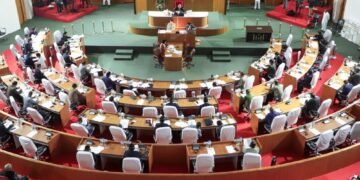In the heart of the world’s largest democracy, the Parliament, a symbol of democratic ideals, is experiencing its most severe crisis since gaining independence. Despite lacking an absolute majority, the BJP operates as though the 2024 mandate hasn’t altered their stance. Meanwhile, a rejuvenated and more vocal Opposition is determined to address past grievances. This has led to a tense deadlock, with both sides refusing to compromise.
The stage for this outcome was set over the years. During the UPA’s rule from 2004 to 2014, the BJP perfected the art of disrupting parliamentary proceedings. Leaders like Sushma Swaraj in the Lok Sabha and Arun Jaitley in the Rajya Sabha even defended these tactics as integral to democracy. When the BJP assumed power in 2014, a weakened Opposition attempted to adopt similar strategies. However, their limited numbers were no match for the BJP’s dominant position.
The result has been a stark decline in the quality of parliamentary proceedings. Prime Minister Modi’s recent speech was continually interrupted by the Opposition’s chants and heckles, a stark contrast to the respectful attention given to Rahul Gandhi during his initial address as Leader of the Opposition.
Parliamentary decorum must be upheld. Disruptions, like entering the well of the House, should cease. The Prime Minister deserves to be heard without interruption. If the Leader of the Opposition wishes to interject, the Prime Minister should courteously allow it. Any further responses should come after the speech. Parliament should not descend into chaos; it should remain a place for thoughtful and intelligent debate.
The crux of the matter is that Parliament is at a standstill, casting serious doubt on its ability to address the people’s real concerns. For Parliament to remain relevant, it must transcend internal conflicts and focus on urgent national issues. Parliamentary rules support this approach. In the Lok Sabha, there’s a provision to adjourn regular business to discuss pressing matters of public importance, with the Speaker’s consent.
Similarly, the Rajya Sabha allows for a notice under Rule 267 to suspend scheduled business for national issues. So, why did the Speaker and the Rajya Sabha Chairman reject the Opposition’s legitimate request to postpone the routine debate on the President’s opening address and instead discuss the critical issue of the NEET paper leaks and the National Testing Agency’s significant failures?
This year, around 2.4 million students took the NEET exam, all vying for a limited number of seats in medical schools. Many students dedicate months or even years to preparing for this exam, with families making significant sacrifices to provide the best coaching and resources. Unfortunately, paper leaks are not a new issue.
Over the past decade, numerous crucial exams, which could have offered employment opportunities to our growing unemployed youth, have been canceled due to approximately 70 instances of paper leaks. This has impacted the futures of around 20 million students. The National Testing Agency’s failure to conduct error-free exams is truly alarming.
Isn’t the compromised future of our youth, due to a flawed testing system, a matter of urgent public importance? I believe it is. The Prime Minister could have earned the gratitude of these aspirants by proposing an immediate discussion on this critical issue. However, he did not take this step. When the Opposition raised the matter, both presiding officers of the House dismissed the request.
With more than 50 per cent of our population under the age of 25 and 65 per cent below 35, we pride ourselves on being one of the youngest nations globally. Had Parliament promptly addressed the exam crisis affecting these young people, it would have significantly reinforced their trust in our democratic system.
Over the past decade, the ruling party has consistently shown a rigid unwillingness to address the Opposition’s concerns, regardless of their validity. Their stance has been clear: with the numbers on their side, they act as they please, leaving the Opposition to protest. As a result, bills have been passed with minimal discussion or review by select committees, and important issues affecting the public have been dismissed. This approach has understandably led to Opposition protests. Amidst the resulting chaos, both Houses have frequently been adjourned, preventing members from fulfilling their duty to seriously discuss urgent public matters.
The critical discussion on NEET and the recurring paper leaks became another casualty of this unfortunate dynamic. I believe that the presiding officers of both Houses should have honoured the Opposition’s request. Previously, a similar plea to urgently address the situation in Manipur—a sensitive border state in a state of civil war for over a year, prompting even RSS chief Mohan Bhagwat to criticise the Central government — was also dismissed.
The pressing question for the average citizen now is: How long will shortsighted parliamentary infighting overshadow the urgent concerns of the people? The futures of millions of students are at stake while parliamentarians continue their disputes. If Parliament does not prioritise the challenges faced by the youth, how can they trust its effectiveness and responsiveness?
A thoughtful and constructive debate on addressing the examination issues and enhancing the efficiency of the NTA would have been the right course of action. Students caught in this unfortunate political maneuvering must be thinking: “Those who prove helpful in times of need are the ones we can truly count on.”
(The writer can be reached at dipakkurmiglpltd@gmail.com)

























